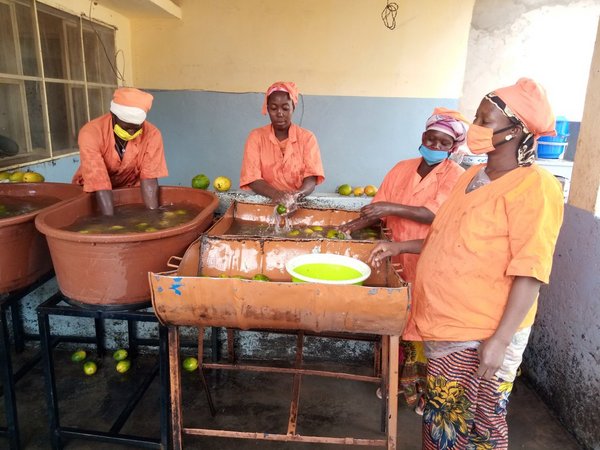 Read this article in French
Read this article in French- Share this article
- Subscribe to our newsletter
Helvetas – supporting innovation in the agricultural sector in times of COVID-19
This spring, Burkina Faso, home to 19.8 million people, was suddenly subject to the restrictions shared by the rest of the world. With an average age of only 18 years, one would assume that being young will give you a fair advantage over the virus. However, individuals lack proper meals, nutrition and even clean water.
The country also faces extreme weather events and attacks by extremist groups. This has led to a massive displacement of almost one million people. Mandatory social distancing, restricted travel, curfews and the threat of contracting the virus without proper medical support have added to the list of woes.
The country is the most “rural” of all West Africa. About 80 per cent of the population depend on agriculture and livestock rearing as a source of income and to feed their families. Anti-COVID-19 measures have hit the sector particularly hard. Because of delicate supply chains, the disruption of one activity leads to the collapse of the others.
A serious impact on the agricultural and food processing sectors
Farmers and traders report severe problems. One example is the Dash in Glory company, which produces poultry feed in Ouagadougou. Normally, the company gets its supplies from partners in France. But they were unable to deliver on time due to travel restrictions. Thus the company could not meet the customers’ needs.
Another example is the breakdown of markets for poultry products owing to the closing of the restaurants in cities like Bobo Dioulasso or Ouagadougou. This has resulted in a serious loss of income for the poultry farmers in the Bobo Dioulasso region.
Further examples of how farmers and food processors were challenged by the COVID-19 restrictions include the processors of mango products like the association PAOLINE, which produces dried mangos, as with a 40 per cent decrease in the production of dry mango, they have been unable to meet their quotas with customers. Increased prices for packaging materials and the difficulties in transport have only added to their woes. Of the 130 women usually employed for the season, only 50 could be taken on this year.
Community based solutions for all sectors
The lives of these farmers, processors and traders in the agricultural sector of Burkina Faso have changed for the worse. Desperate times call for clever ideas. It was necessary to urgently help the agricultural enterprises.
The Programme to support the promotion of agricultural entrepreneurship (Programme d’Appui à la Promotion de l’Entrepreneuriat Agricole, or PAPEA) a project of the Swiss Agency for Development and Cooperation (SDC), implemented by Helvetas and the Dutch NGO SNV, organised a dialogue between the players of each sector to come up with solutions. Only the players in the chain understand the unique situation of each sector in their specific region. Tailor-made solutions with well-conceived investments enable them to find sustainable and effective measures rather than short-term ones. The solutions came in three groups: investing in COVID-19 protection measures, in new ways of maintaining and even improving agribusiness – and in cooperation instead of competition to increase resilience and turn the crisis into an opportunity.
Better infrastructure
To give an example of improvement measures, the project PAPEA co-invested with the manager of the poultry feed company Dash in Glory company in Ouagadougou to buy an equipment line so that the poultry feed business could produce on its own instead of depending on imports from France. Thanks to the new equipment, the company can increase production capacity and reduce the ramifications of the crisis regarding quality and quantity. And it can create permanent jobs.
Bridging the gaps
To support the poultry producers and mitigate the impact of the COVID-19 crisis, the project set up emergency investment plans. A monitoring unit is studying the evolution of prices, stocks of inputs (animal feed and vaccines) and products (chickens and other birds), and shares the information with the producers. Defining the most vulnerable parts helps identify and remove the blockages in the supply chains. To dissipate fears that chickens “may be infected with COVID” and to inform consumers where to buy meat when markets are closed, a marketing campaign will run in consumption points in Bobo-Dioulasso, on the radio and on social networks.
Retaining quality produce
While the mango season was still in full swing in June and July, as an anti-COVID-19 measure, processing units and producers received sanitary kits, thermo flashes to take temperature and awareness posters.
To further support the players in the mango sector, in a similar way to the poultry activities, the PAPEA has developed an emergency investment plan. A business intelligence unit is monitoring the negative effects of the crisis and economic risks in order to speed up the analysis of the situation and generate a rapid and collective response within the business cluster.
To counter problems created by COVID-19, it is important to help players of each sector find solutions that work best for them. We encourage entrepreneurial ventures that build a community of people working together, in particular, young men and women. The new and revamped business clusters and agricultural businesses increase income and generate jobs. With some support, the worst hit sectors during the virus – mango, poultry, eggs and milk – can still work their way around in these dire times.
(Helvetas/wi)





Add a comment
Be the First to Comment